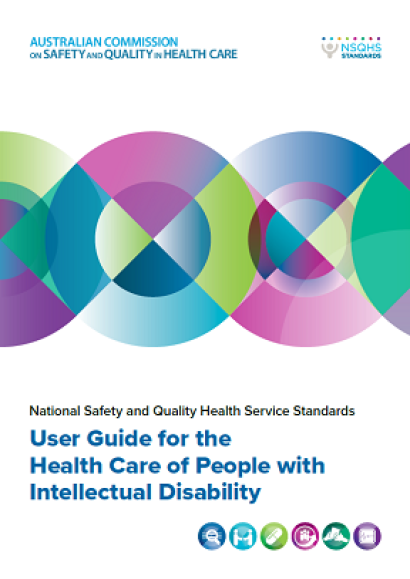Intellectual disability and inclusive health care
The National Safety and Quality Health Service (NSQHS) Standards support the rights of people with intellectual disability to equitable health care. People with intellectual disability experience significant barriers in accessing safe and quality care evident through a higher mortality rate, increased incidence of preventable illness and more frequent hospital admissions.
In this section, you will find guidance and resources for implementation of the NSQHS Standards, to support healthcare rights and provision of inclusive health care.
New Easy read fact sheets
User Guide for the Health Care of People with Intellectual Disability
The Commission developed the National Safety and Quality Health Service (NSQHS) Standards User guide for the health care of people with intellectual disability in response to significant evidence of poor health outcomes for people with intellectual disability in Australia’s health system.
Our new User Guide includes:
- Information on how each Standard is relevant to health care for people with intellectual disability
- Key Actions under the Standard relevant for people with intellectual disability
- Evidence-based strategies for improvements by Action
- Resources for organisations and clinicians
Standards and healthcare rights
The implementation of the National Safety and Quality Health Service (NSQHS) Standards supports the rights of people with intellectual disability to equitable health care.
People with intellectual disability are included under the Australian Charter of Healthcare Rights with the same rights to: Access, Safety, Respect, Partnership, Information, Privacy and Give feedback.
Australia's Disability Strategy 2021–2031 recognises that application of the ‘social model of disability’, as identified in the United Nations Convention on the Rights of Persons with Disabilities, is critical to improving healthcare outcomes for people with disability, including for people with intellectual disability. The Strategy recognises attitudes, practices and structures can be disabling and act as barriers preventing people from fulfilling their potential and exercising their rights as equal members of the community.
Four Steps to Inclusive Health Care: With Me and About Me
The Commission has developed four steps to assist clinicians in the provision of inclusive health care. Each step requires inclusion of the person receiving care.
Reasonable adjustments
A reasonable adjustment is a change to an existing approach or process which is essential to ensure a person’s access to a service. Reasonable adjustments for people with disability are required under the Commonwealth Disability Discrimination Act 1992 and the disability inclusion legislation of each state and territory.
Making reasonable adjustment for a person’s disability creates an inclusive environment and facilitates meeting the NSQHS Standards, for example, providing safe and high-quality care.
Resources
Further resources are available to assist those with intellectual disability and their family and supporters to understand and advocate for equitable health care, as part of the Commission’s support for improved health care for people with intellectual disability.




